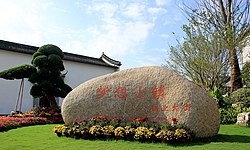Yuhang is one of ten urban districts of the prefecture-level city of Hangzhou, the capital of Zhejiang Province, East China. Its 2013 population was estimated at 1.17 million. Its inhabitants speak both Mandarin and a variety of Hangzhounese, a Wu dialect.
Yuhang
余杭区 | |
|---|---|
 Dream Town of Hangzhou Future Sci-Tech City | |
 Location of Yuhang District within Hangzhou | |
| Coordinates: 30°09′N 119°40′E / 30.150°N 119.667°E | |
| Country | People's Republic of China |
| Province | Zhejiang |
| Sub-provincial city | Hangzhou |
| Area | |
| • Total | 1,228.41 km2 (474.29 sq mi) |
| Population (2022) | |
| • Total | 1,390,900 |
| • Density | 1,100/km2 (2,900/sq mi) |
| Time zone | UTC+8 (China Standard) |
| Yuhang, Hangzhou | |||||||
|---|---|---|---|---|---|---|---|
| Simplified Chinese | 余杭区 | ||||||
| Traditional Chinese | 餘杭區 | ||||||
| |||||||

On April 9, 2021, Linping District was established, consisting of the former Yuhang subdistricts of Linping, Donghu, Nanyuan, Xingqiao, Yunhe, Qiaosi, Chongxian and the Town of Tangxi.[1][2]
Yuhang is the largest district of Hangzhou. The administration center of Yuhang District is Linping, which is a subcenter of Hangzhou located in the northeast side of downtown area. It connects with the downtown via Metro Line 3.
History
editThe district contains the remains of Neolithic settlements from the Liangzhu period.
Prior to the expansion of modern Hangzhou, Yuhang formed a separate city. It is the earliest settlement recorded in the area of present-day Hangzhou. Chinese scholars traditionally interpreted its name as a mistake for "Yu's Ferry" (禹航; Yǔháng), after the legendary account of Yu the Great's gathering of his lords at Mount Kuaiji around 2000 BC. This is now thought to be a folk etymology and Yuhang (Old Chinese: *La-gang) is almost certainly an ancient transliteration of an old Baiyue name.[3]
Yuhang was part of Kuaiji Commandery prior to the growth of Hangzhou following the 7th-century construction of the Sui's Grand Canal. It was then administered from Hangzhou.
Administrative divisions
editSubdistricts:[4]
- Renhe Subdistrict (仁和街道), Liangzhu Subdistrict (良渚街道), Wuchang Subdistrict (五常街道), Yuhang Subdistrict (余杭街道), Xianlin Subdistrict (闲林街道), Cangqian Subdistrict (仓前街道), Zhongtai Subdistrict (中泰街道)
Towns:
Features
editThe famous tourist attractions here include Liangzhu Culture Museum, Jingshan Tea and Buddhist Monastery, Tangxi Ancient Town, The Grand Canal, Chaoshan Scenic Area, Tianducheng Resorts and Xixi National Wetland Park.
References
edit- ^ 浙江在线. "再次调整!杭州行政区划经历过哪些变化?". Retrieved 2021-04-09.
- ^ "重磅消息!国务院批复同意杭州部分行政区划优化调整". 杭州网. 2021-04-09.
- ^ Zhongguo lishi diming dacidian 中國歷史地名大詞典, (Shanghai: Shanghai cishu chubanshe): 1516.
- ^ "杭州市-行政区划网 www.xzqh.org" (in Chinese). XZQH. Retrieved 2012-05-24.
